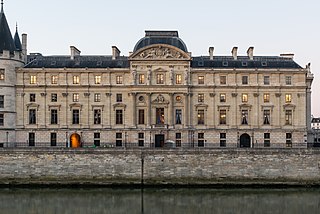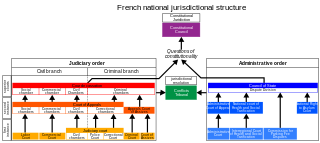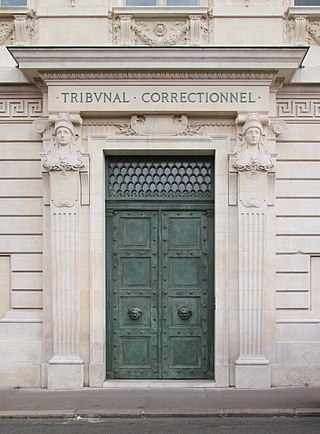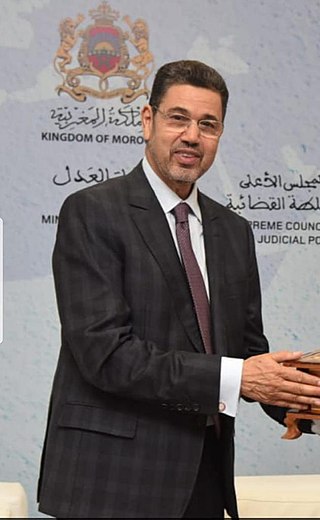Related Research Articles

The Court of Cassation is the supreme court for civil and criminal cases in France. It is one of the country's four apex courts, along with the Council of State, the Constitutional Council and the Jurisdictional Disputes Tribunal.

The Palais de Justice, is a judicial center and courthouse in Paris, located on the Île de la Cité. It contains the Court of Appeal of Paris, the busiest appellate court in France, and France's highest court for ordinary cases, the Court of Cassation. It formerly housed the Tribunal de grande instance de Paris which was relocated in 2018 to a new high-rise building in Paris's Batignolles neighborhood. The Palais de Justice occupies a large part of the medieval Palais de la Cité, the former royal palace of the kings of France, which also includes Sainte Chapelle, the royal chapel, and the Conciergerie, a notorious former prison, which operated from 1380 to 1914. It is located in close proximity to the Tribunal of Commerce, the Prefecture of Police of Paris, and the offices of the Paris Bar Association.

Robert Falco was a French judge at the Nuremberg trials, who later sat in the Cour de Cassation.

French law has a dual jurisdictional system comprising private law, also known as judicial law, and public law.

The Court of Cassation of Belgium is the supreme court of the Belgian judiciary. The court is composed of thirty judges with life tenure who are nominated by the High Council of Justice of Belgium and appointed by the Belgian federal government. The court handles cases in the two main languages of Belgium, Dutch and French, and provides certain facilities for cases in German. The court is assisted in its work by a public prosecutor's office and a bar association, which both function separately from other structures. The duty of the public prosecutor's office is to provide advisory opinions to the court on how the law ought to be interpreted and applied. The attorneys of the court's bar association assist litigants in proceedings before the court; in certain cases, their assistance is mandatory.

Massimo Pilotti was an Italian jurist and judge. Pilotti was the first President of the European Court of Justice at Luxembourg.

The Supreme Court is the highest civil and criminal court in Burundi. It has nine members, including the Court President, who are nominated by the Judicial Service Commission and appointed by the President of the Republic after the approval of the Senate. The court's president is referred to as the Chief Justice.
Pierre Arpaillange was a French author, senior judge and Government Minister.

The Supreme Court of Haiti is the highest court in the Haitian legal system. The Supreme Court building is located in Port-au-Prince.

Louis Gaspard Amédée, baron Girod de l'Ain was a French lawyer and politician who became Minister of Public Education and Religious Affairs in 1832.
André Potocki is a French jurist and was appointed a judge of the European Court of Human Rights on 4 November 2011.

In French law, the ministère public or le parquet is the authority charged with defending the interests of society and of the application of law. It is primarily made up of magistrates, but is sometimes represented by other persons such as police officials. Its magistrates can be referred to as "standing" magistrates, as opposed to magistrats du siège. Its closest equivalent in some English-speaking countries is the director of public prosecutions and the attorney general in others.

In France, a cour d’appel of the ordre judiciaire (judiciary) is a juridiction de droit commun du second degré, a. It examines judgements, for example from the correctional tribunal or a tribunal de grande instance. When one of the parties is not satisfied with the verdict, it can appeal. While communications from jurisdictions of first instance are termed "judgements", or judgments, a court of appeal renders an arrêt (verdict), which may either uphold or annul the initial judgment. A verdict of the court of appeal may be further appealed en cassation. If the appeal is admissible at the cour de cassation, that court does not re-judge the facts of the matter a third time, but may investigate and verify whether the rules of law were properly applied by the lower courts.

In France, the correctional court is the court of first instance that has jurisdiction in criminal matters regarding offenses classified as délits committed by an adult. In 2013, French correctional courts rendered 576,859 judgments and pronounced 501,171 verdicts.

In France, a procureur général is a prosecutor at a court of appeal, at the Court of Cassation or the Court of Audit. In the case of the appellate courts, the term refers to the magistrate who conducts the prosecution for the court of appeal, as opposed to the judges.
Sarah Halimi was a retired French doctor and schoolteacher who was attacked and killed in her apartment on 4 April 2017. Circumstances surrounding the killing—including the fact that Halimi was Jewish, and that the assailant had shouted Allahu akbar during the attack and afterward proclaimed "I killed the Shaitan"—cemented the public perception, particularly among the French Jewish community, that it was a stark example of antisemitism in modern France.
Pierre Truche was a French magistrate. He notably prosecuted Klaus Barbie during his trial in 1987.

M'hammed Abdenabaoui, born on 21 August 1954 in Khouribga, is a senior Moroccan magistrate and the former attorney general of the King at the Court of Cassation. In 2021, he was appointed by king Mohammed VI as the first President of the Cour of Cassation and deputy President of the Supreme Council of the Judicial Power. He's a noted defender of the independence of the judiciary from the legislative and executive branches.
Vincenzo Vecchi is an Italian "altermondialist".
References
- ↑ The Court of Justice of the European Communities > The former Members
- ↑ Audience solennelle du 9 octobre 1973 [...]: "Discours prononcé par le Président de la Cour à l'audience du à la mémoire de M. R. Rossi, juge à la Cour de justice des communautés européennes, décédé à Rome (Italie) le 6 février 1974" pages 27-28. Office des Publications des communautés européennes, c1974